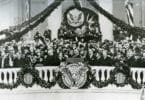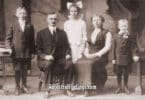Early Life and Education
John Quincy Adams was born on July 11, 1767, in Braintree, Massachusetts, to John and Abigail Adams. Growing up in a politically active household, Adams was exposed to the revolutionary ideas of the time. His father, John Adams, was a key figure in the American Revolution and would later become the second President of the United States. This environment undoubtedly influenced young John Quincy, instilling in him a sense of duty and a passion for public service.
Adams received a rigorous education, both formal and informal. His mother, Abigail, was instrumental in his early education, teaching him to read and write at a young age. He later attended Harvard College, graduating in 1787. Adams’ education was not limited to the classroom; he accompanied his father on diplomatic missions to Europe, gaining firsthand experience in international relations and politics.
Early Career and Diplomacy
Adams’ diplomatic career began at an early age. At just 14, he served as a secretary to the American minister to Russia. This experience provided him with invaluable insights into European politics and diplomacy. Over the years, Adams held several key diplomatic positions, including minister to the Netherlands, Prussia, and Russia. His fluency in multiple languages and his keen understanding of international affairs made him an effective diplomat.
One of Adams’ most significant diplomatic achievements was his role in negotiating the Treaty of Ghent, which ended the War of 1812 between the United States and Great Britain. His efforts helped restore peace and set the stage for improved relations between the two nations.
Secretary of State
In 1817, Adams was appointed Secretary of State by President James Monroe. During his tenure, he played a pivotal role in shaping American foreign policy. One of his most notable accomplishments was the formulation of the Monroe Doctrine, which declared that the Americas were off-limits to further European colonization. This policy had a lasting impact on U.S. foreign relations and solidified Adams’ reputation as a skilled statesman.
Adams also successfully negotiated several important treaties, including the Adams-Onís Treaty with Spain, which ceded Florida to the United States and defined the boundary between the U.S. and Spanish territories in North America. His tenure as Secretary of State was marked by a series of diplomatic successes that bolstered America’s position on the world stage.
Presidency (1825-1829)
John Quincy Adams’ presidency, which began in 1825, was marked by both achievements and challenges. He won the presidency in a contentious election that was decided by the House of Representatives, as no candidate received a majority of electoral votes. This “corrupt bargain,” as it was called by his opponents, tainted his presidency from the start.
Adams was a strong advocate for a broad program of national improvements, including the construction of roads, canals, and educational institutions. He believed that the federal government should play a significant role in advancing the nation’s infrastructure and intellectual development. However, his ambitious agenda faced strong opposition from Congress, particularly from those who believed in a more limited role for the federal government.
Despite these challenges, Adams managed to achieve some notable successes during his presidency. He oversaw the completion of the Erie Canal, which connected the Great Lakes to the Atlantic Ocean, facilitating trade and commerce. He also supported the establishment of a national university and a naval academy, though these initiatives were not realized during his presidency.
Post-Presidency and Congressional Career
After losing the 1828 presidential election to Andrew Jackson, Adams did not retire from public life. Instead, he embarked on a remarkable post-presidential career by serving in the House of Representatives for 17 years. This was an unprecedented move, as no former president had ever returned to serve in Congress.
In the House, Adams became a vocal advocate for the abolition of slavery. He passionately opposed the “gag rule,” which prevented the discussion of anti-slavery petitions in Congress. His relentless efforts to fight against slavery earned him the nickname “Old Man Eloquent.” Adams also played a key role in the Amistad case, where he successfully argued for the freedom of a group of African captives who had rebelled against their captors on a Spanish ship.
Personal Life and Legacy
John Quincy Adams married Louisa Catherine Johnson in 1797. Louisa, the daughter of an American merchant and a British mother, was the only foreign-born First Lady of the United States. Together, they had four children: George Washington Adams, John Adams II, Charles Francis Adams, and Louisa Catherine Adams.
Adams was known for his disciplined lifestyle and his dedication to intellectual pursuits. He was an avid reader and writer, keeping a detailed diary throughout his life that provides valuable insights into his thoughts and experiences. His commitment to education and knowledge was evident in his support for the establishment of the Smithsonian Institution, which was founded based on his advocacy and vision.
Adams passed away on February 23, 1848, in Washington, D.C., while serving in the House of Representatives. His legacy as a dedicated public servant, a fierce advocate for abolition, and a skilled diplomat endures to this day. He is remembered for his unwavering commitment to the principles of liberty and justice, as well as his contributions to the early development of the United States.
John Quincy Adams’ life was characterized by a relentless pursuit of public service and a deep commitment to the principles upon which the United States was founded. From his early diplomatic missions to his presidency and his later years in Congress, Adams consistently worked to advance the nation’s interests and uphold its values. His legacy as a statesman, an advocate for education, and a champion of human rights continues to inspire future generations.
These books offer diverse perspectives on John Quincy Adams and his era, providing a well-rounded understanding of his contributions to American history.
“John Quincy Adams: American Visionary” by Fred Kaplan
This comprehensive biography explores John Quincy Adams’s life and legacy, focusing on his political career, personal life, and enduring impact on American history. Fred Kaplan’s meticulous research and engaging writing style make this a must-read.
“John Quincy Adams” by Harlow Giles Unger
Harlow Giles Unger’s biography vividly portrays Adams’ life, from his early years to his presidency and beyond. The book highlights his diplomatic achievements and later work as a congressman and abolitionist.
“Louisa: The Extraordinary Life of Mrs. Adams” by Louisa Thomas
This biography of Louisa Catherine Adams, John Quincy Adams’ wife, offers a unique perspective on his life and times. Louisa Thomas delves into Louisa Adams’ challenges and triumphs, giving readers a richer understanding of the family dynamic.
“The Remarkable Education of John Quincy Adams” by Phyllis Lee Levin
Focusing on John Quincy Adams’s early years and education, Phyllis Lee Levin’s book provides an in-depth look at the formative experiences that shaped his character and career. It’s fascinating to explore how Adams’ upbringing influenced his later achievements.
“John Quincy Adams: Militant Spirit” by James Traub
James Traub’s biography examines John Quincy Adams as a passionate and often uncompromising figure in American politics. Traub highlights Adams’ dedication to principles, his fight against slavery, and his vision for America’s future.






